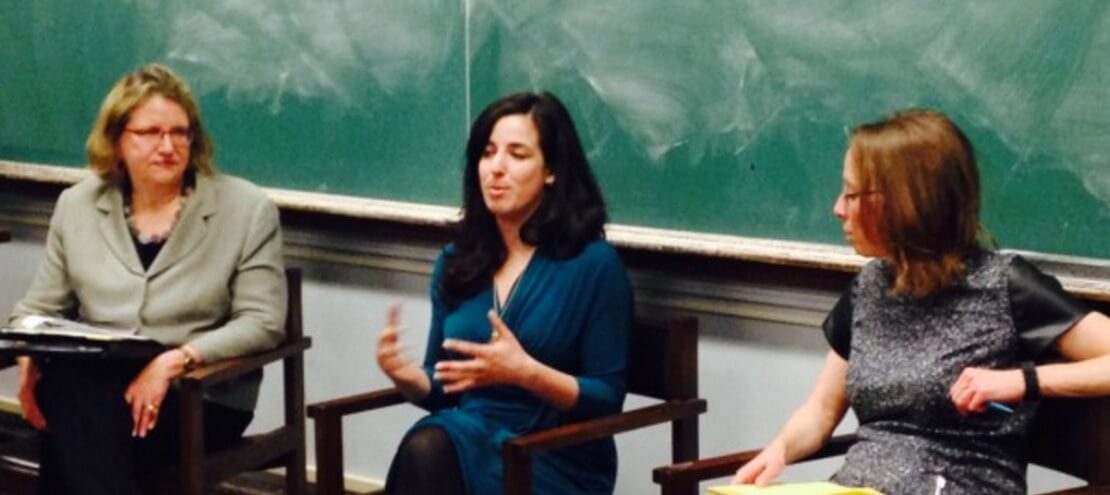
According to the Center for American Progress, women hold only 14.6 percent of executive officer positions, 8.1 percent of top-earning positions and 4.6 percent of Fortune 500 CEO positions. With that said, it’s no surprise that there is an ongoing discussion – one that has taken a front seat in recent years – about how companies can encourage women to pursue high-level career opportunities and better attract, retain and—most importantly—advance female talent.
The current state of women in the workplace was the topic of a recent event held by the New York City Chapter of Young Professionals in Energy (YPE). Featuring an interactive panel discussion between women in executive roles in the energy sector, the speakers delved into key issues for women in the industry and beyond, ranging from the myth of the linear career path to the need for increased STEM education resources.
The Corporate Jungle Gym
Generally, women face both internal and external pressure to follow a “straight” path in the business world without straying from that route for any reason—the most notable being to start a family. The panelists agreed that the idea of career advancement always being linear is nothing short of a myth—their career paths have each been a testament to that.
As stated by panelist Claire Broido Johnson, chief of new markets and services at Next Step Living and SunEdison co-founder, “The corporate world can be better compared to a jungle gym than a ladder, as there is no single, correct way to advance upwards.”
Claire also stressed the importance of valuing each stepping-stone of a career path, and keeping experiences in a “toolbox” for use later in life. These tools will prove valuable when pursuing a new career or opportunity to advance.
Women in STEM
A key focus of the conversation was the lack of women in the science, technology, engineering and math (STEM) fields and what can be done to increase the presence of women in STEM. Panelist Stefanie Matteson, vice president at Antenna Group, brought up the push for science education in our country for both male and female students in 1957, after the Soviet Union launched Sputnik and the government felt that America was falling behind. The panelists discussed how a similar push would be beneficial today for enhancing the involvement of women in STEM fields. Climate change could be the driver needed to spark this movement, as the U.S. government is seeking the increased resources required to redesign the country’s energy infrastructure.
“The Confidence Gap”
The discussion continually tied back to the influence of a single factor on a woman’s success: confidence. Evidence has shown that women tend to be less self-assured than men – as cited in The Atlantic’s 2014 article “The Confidence Gap,” which was referenced in the discussion by panelist Genevieve Rose Sherman, assistant director of commercial and industrial programs at the Connecticut Clean Energy & Finance Authority. Genevieve brought up a compelling point: Women often feel the need to have all of their bases covered in order to feel confident and ensure that they will not be caught off guard, whereas men have demonstrated a greater ability to speak assertively on a subject without having extensive background knowledge. Women need to let go of this restraint in order to achieve a greater degree of success.
Playing into the theme of confidence, Claire Broido Johnson stressed the value of sponsorship and mentorship as a means of garnering the support needed in the industry to achieve success. A trusted advisor – whether female or male – plays an integral role in enhancing a woman’s confidence and encouraging grit and perseverance in difficult situations. The panelists agreed on the importance of finding a confidant that you can listen to and trust, as well as the importance of supporting other women and serving as a mentor or sponsor when possible.
Work-Life Balance
The Women in Power agreed that life is not as short as it’s made out to be. They’re a testament to the idea that you can “have it all”—but you don’t need to have it all at the same time, as put by Genevieve Sherman. To achieve this, the panelists stressed the importance of maintaining a work-life balance and reinforced the idea that a job does not always have to take precedence over a personal life to ensure a successful career. For example, having children does not require a halt to a woman’s career, and for those women who do choose to take a break from their careers for any reason, “encore” careers later in life are viable.